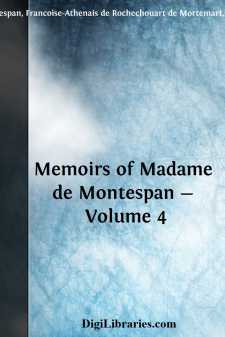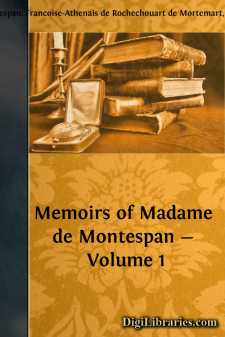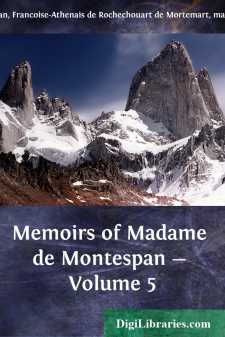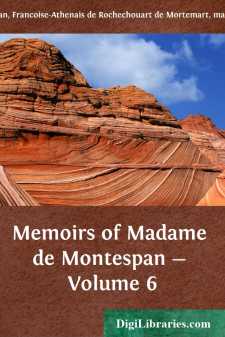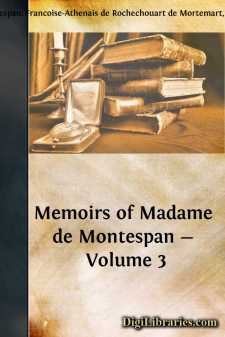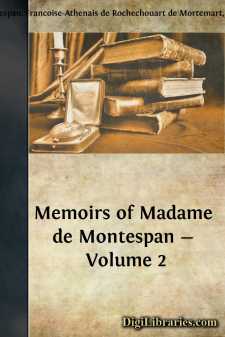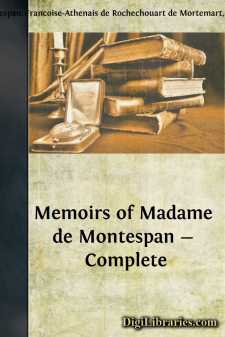Categories
- Antiques & Collectibles 13
- Architecture 36
- Art 48
- Bibles 22
- Biography & Autobiography 813
- Body, Mind & Spirit 142
- Business & Economics 28
- Children's Books 17
- Children's Fiction 14
- Computers 4
- Cooking 94
- Crafts & Hobbies 4
- Drama 346
- Education 46
- Family & Relationships 57
- Fiction 11829
- Games 19
- Gardening 17
- Health & Fitness 34
- History 1377
- House & Home 1
- Humor 147
- Juvenile Fiction 1873
- Juvenile Nonfiction 202
- Language Arts & Disciplines 88
- Law 16
- Literary Collections 686
- Literary Criticism 179
- Mathematics 13
- Medical 41
- Music 40
- Nature 179
- Non-Classifiable 1768
- Performing Arts 7
- Periodicals 1453
- Philosophy 64
- Photography 2
- Poetry 896
- Political Science 203
- Psychology 42
- Reference 154
- Religion 513
- Science 126
- Self-Help 84
- Social Science 81
- Sports & Recreation 34
- Study Aids 3
- Technology & Engineering 59
- Transportation 23
- Travel 463
- True Crime 29
Memoirs of Madame de Montespan - Volume 4
Categories:
Description:
Excerpt
President de Nesmond—upright, clear-headed magistrate as he was—was of very great service to me at the Courts of Justice. He always managed to oblige me and look after my interests and my rights in any legal dispute of mine, or when I had reason to fear annoyance on the part of my husband.
I will here relate the grief that his young wife caused him, and it will be seen that, by the side of this poor President, M. de Montespan might count himself lucky. Having long been a widower, he was in some measure accustomed to this state, until love laid a snare for him just at the age of sixty-five.
In the garden that lay below his windows—a garden owned by his neighbour, a farmer—he saw Clorinde. She was this yeoman's only daughter. He at once fell passionately in love with her, as David once loved Bathsheba.
The President married Clorinde, who was very pleased to have a fine name and a title. But her husband soon saw—if not with surprise, at least with pain—that his wife did not love him. A young and handsome Spaniard, belonging to the Spanish Legation, danced one day with Clorinde; to her he seemed as radiant as the god of melody and song. She lost her heart, and without further delay confessed to him this loss.
On returning home, the President said to his youthful consort, "Madame, every one is noticing and censuring your imprudent conduct; even the young Spaniard himself finds it compromising."
"Nothing you say can please me more," she replied, "for this proves that he is aware of my love. As he knows this, and finds my looks to his liking, I hope that he will wish to see me again."
Soon afterwards there was a grand ball given at the Spanish Embassy. Madame de Nesmond managed to secure an invitation, and went with one of her cousins. The young Spaniard did the honours of the evening, and showed them every attention.
As the President was obliged to attend an all-night sitting at the Tourelle,—[The parliamentary criminal court.]—and as these young ladies did not like going home alone,—for their residence was some way off,—the young Spaniard had the privilege of conducting them to their coach and of driving back with them. After cards and a little music, they had supper about daybreak; and when the President returned, at five o'clock, he saw Melladoro, to whom he was formally introduced by madame.
The President's welcome was a blend of surprise, anger, forced condescension, and diplomatic politeness. All these shades of feeling were easily perceived by the Spaniard, who showed not a trace of astonishment. This was because Clorinde's absolute sway over her husband was as patent as the fact that, in his own house, the President was powerless to do as he liked.
Melladoro, who was only twenty years old, thought he had made a charming conquest. He asked to be allowed to present his respects occasionally, when Clorinde promptly invited him to do so, in her husband's name as well as in her own.
It was now morning, and he took leave of the ladies. Two days after this he reappeared; then he came five or six times a week, until at last it was settled that a place should be laid for him every day at the President's table.
That year it was M. de Nesmond's turn to preside at the courts during vacation-time. He pleaded urgent motives of health, which made it imperative for him to have country air and complete rest....


